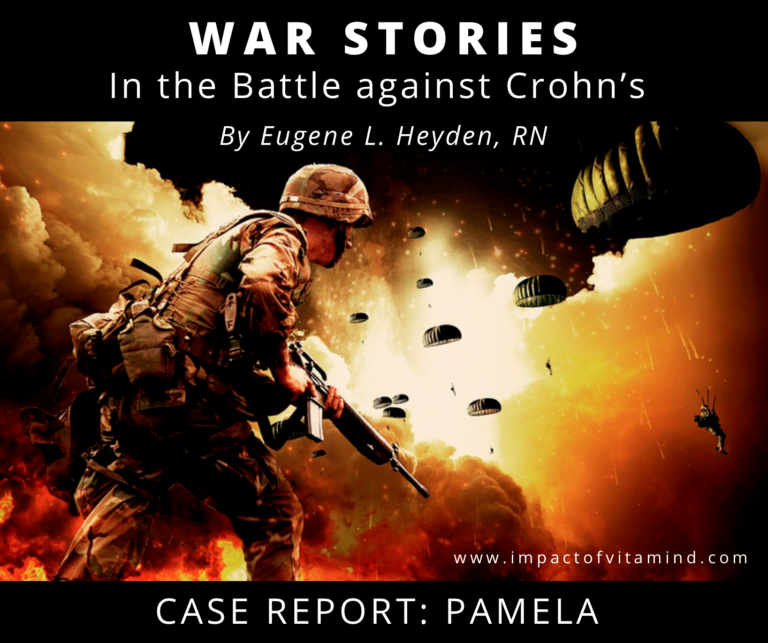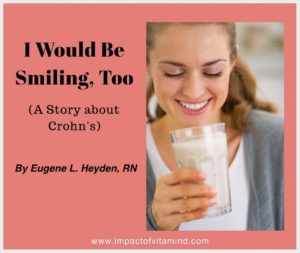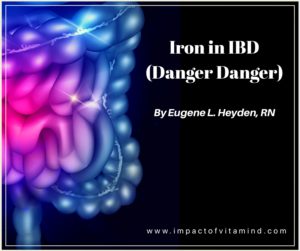War Stories: Pamela

Last revision: 07-11-23
By Eugene L. Heyden, RN
“Progesterone is crucial for reproductive organ development and maintenance of pregnancy, and more recent studies have clearly shown its role as an important immune regulator.
“Progesterone is also secreted during the nonpregnant state and has been shown to have a direct effect on immune cells.” ~Tait et al., 2008, emphasis added
Progesterone has been your friend, right from the start. This is the hormone your mother used during pregnancy, created in generous amounts, and deployed to shield you from the wrath of her immune system. This hormone prevented you from being “rejected”—allowing you to develop within the womb and be born when the moment was right. And when it was time to see what life was like on the outside, you produced (surged) a hormone that stopped progesterone dead in its tracks, which led to the violent inflammatory reaction we call labor (Condon et al., 2004). Sounds crazy, but it is true. Progesterone shielded you and kept you safe. And it did so by restraining the pro-inflammatory responses of that special someone who would later welcome you with open arms.
In this article I make the case that, once again, progesterone can be your friend. And I learned this lesson from a friend.
Case report: Pamela
Over a decade ago, I met an individual in her mid-30’s who was not particularly pleased with her Crohn’s. (Can’t imagine why.) She had only been dealing with the disease for less than a year, as I recall, but saw the handwriting on the wall—knowing that this disease can quickly go from bad to worse, even under the best of medical care. I will respect her privacy and give her the name Pamela.
Pamela was one of those individuals who did not like playing along— believing there was something else out there other than what was being offered, something she needed to discover, something that would bring an end to the trouble she was experiencing. In addition to the disease itself, she hated the medication she was on (Asacol) and had no interest at all in steroid therapy. And being placed on a biologic was completely out of the question. As you can tell Pamela is one of those “problem” patients, loved by her physician but skeptical and resistant to his or her every move.
Soon after I became acquainted with Pamela, she shared with me her plight and asked me if I had any ideas that could be of help. I did, and shared with her the usual things to consider—like vitamin D, like probiotics, like curcumin. But none of this was put to the test, which was just fine with me. Because what would happen next, turned things completely around for Pamela. It changed her life. And it changed my life, too.
About the same time that I was getting to know Pamela, she was establishing a friendship with an individual who just happened to be the wife of a local physician. Upon learning that Pamela was suffering from Crohn’s, her new friend insisted she make an appointment with her husband, who just happened to be an expert in hormone therapy. And soon an appointment was made. Incidentally, this physician happened to be my physician, too.
From freely shared information (only by Pamela, mind you), during her initial doctor’s appointment the good doctor strongly suspected Pamela was suffering from a hormonal imbalance, and believed that correcting this may help her in her battle against Crohn’s. Looking back, I’m not surprised, as he shared with me stories, without naming names (mind you), of other individuals with inflammatory conditions who he was able to help with his style of hormone therapy. Continuing our story . . .
Several weeks after her initial doctor’s appointment, I ran into Pamela. She was all smiles, with exciting news to share. She told me that her symptoms—abdominal pain and GI bleeding—had vanished into thin air and did so within a matter of days! It didn’t take me long to realize something incredible had happened. Why so suddenly? Why so unexpectedly? What could it be? And when Pamela told me it was progesterone that turned things around for her, I made it my mission to find out why. This could help others (which is what I am all about).
As a side note, it is because of my exposure to Pamela’s experience that I developed a keen interest, indeed a passion, of all things IBD. Realizing the significance of what I had witnessed, and compelled by a sense of moral obligation, I decided that I needed to share Pamela’s story with others. And it didn’t take me long to realize, that to be able to tell her story effectively, I would need to learn all I could about Crohn’s. And I never looked back. I have never stopped studying the disease. Now you know why I have a passion to educate along these lines and why you are reading this article. But enough about me. The story is really about Pamela.
As we visited, Pamela shared with me the details and her understanding of how her remission was achieved.
At Pamela’s first office visit, her new physician wanted to find out if she was estrogen dominant during the luteal phase (latter half) of her monthly cycle—a time when progesterone levels should be elevated in order to restrain the proinflammatory actions driven by elevated estrogen levels. So testing was in order.
Did you know that you can have your hormone levels tested just by spitting . . . a lot? Saliva testing is the method preferred by many physicians who test for estrogen dominance, including Pamela’s new physician. As Pamela recounts, “I’ve never spit so much in all my life!” as she filled what seemed to be an endless array of lab tubes. But it was time well spent. By saliva testing around day 19 of her monthly cycle, it was determined that she was, indeed, estrogen dominant. This basically means that progesterone levels are not sufficiently elevated to restrain the proinflammatory effects of estrogen, and someone gets to lead a proinflammatory life. Come to find out, inappropriate estrogen dominance (relative progesterone insufficiency) during the latter half of the menstrual cycle can have far-reaching effects, and people who are treated for their estrogen dominance often report dramatic improvements in a variety of symptoms and an improvement in overall health.
Testing is one thing, doing something about the result is another. Estrogen dominance, now identified, should probably be addressed. And it was. Pamela was prescribed natural progesterone cream, 35 mg, to be applied daily to select areas of the skin on days 15 through 26 of her menstrual cycle. Recall, this is a time when extra progesterone is needed to suppress the proinflammatory influence of estrogen. That’s it! This was the therapeutic approach that turned things around for Pamela. Counteracting the proinflammatory actions of estrogen was the strategy employed. And during the first cycle of treatment, Pamela went into remission in her battle against Crohn’s. According to the dosing schedule prescribed, progesterone is held on day 27 of each cycle in order to initiate the menses and held for the following 2 weeks as estrogen should dominate during this phase of the cycle, and for a variety of reasons. Progesterone is again resumed on day 15, to continue through day 26. By continuing this pattern (using a form of progesterone identical to the hormone she ordinarily produces), Pamela maintains her remission, which has lasted now for over a decade.
On a personal note: When I shared Pamela’s story with a gastroenterologist friend of mine, she told me that in her pediatric practice, once “her girls” approach or enter puberty their Crohn’s symptoms almost invariably get worse and become much more difficult to manage. Why am I not surprised?
“In the absence of pregnancy, progesterone levels decline . . . and progesterone withdrawal triggers an inflammatory cascade . . . culminating in shedding of the upper-functional layer during menses.” (Thiruchelvam et al., 2013)
The menstrual cycle is, indeed, a cycle of proinflammatory responses, responses that are not always well contained. I suspect, estrogen dominance is quite common in both the young as well as in those who are not so young.
Why the favorable response?
The following should help explain why Pamela responded so favorably to progesterone and why this hormone should be strongly considered for use in the battle against Crohn’s:
- Progesterone can block NF-ĸB activation in the cells of the immune system, including immune cells active within the gut (van der Burg and van der Saag, 1996; Chen et al., 2007)
- Progesterone can reduce TNF-α production by the macrophage, in the gut and elsewhere (Chen et al., 2008; Miller and Hunt, 1998)
- Progesterone can improve intestinal barrier function, known to be compromised and problematic in patients with Crohn’s (Chen et al., 2007; Laukoetter et al., 2008)
- Progesterone can increase IL-10 levels in the gut and just about everywhere (Miyaura and Iwata, 2002)
- Progesterone can encourage the macrophage to develop away from a proinflammatory M1 phenotype to become an anti-inflammatory and pro-healing M2 macrophage (Menzies et al., 2011)
- Progesterone can stimulate autophagy, a mechanism within the cell that destroys intracellular pathogens (Lee et al., 2012)
- Progesterone can increase the numbers and effectiveness of Treg cells, cells which oppose the actions of proinflammatory Th17 cells (Lee et al., 2012)
- Progesterone can bind to glucocorticoid receptors, as do other steroid hormones, thereby reducing inflammation (Klein, 2012)
- Progesterone can suppress the Th1 immune response, the pattern of immune response we see in Crohn’s (Dosiou et al., 2004)
Let’s bring this article to a close, as follows:
“In summary, the results of our study demonstrate that P4 [progesterone] is a potent inhibitor of macrophage TNF-α gene activity and TNF-α protein production. This P4-mediated suppressive effect on TNF-α production lends support to the concept that female sex steroid hormones such as P4 are capable of profoundly altering the outcome of an immune response by regulating macrophage activation and production of inflammatory cytokines in tissues proximal to the production of P4.” (Miller and Hunt, 1998, emphasis added)
Note: In a forthcoming post I will tell the story of another individual whose bowel issues rapidly resolved by the use of progesterone. You’ll be impressed. Stay tuned!
Recommended posts (Click image to open)
References
Chen G, Shi J, Ding Y, Yin H, Hang C. Progesterone prevents traumatic brain injury-induced intestinal nuclear factor kappa B activation and proinflammatory cytokines expression in male rats. Mediators of inflammation. 2007 Oct;2007. https://www.hindawi.com/journals/mi/2007/093431/
Chen G, Shi JX, Qi M, Wang HX, Hang CH. Effects of progesterone on intestinal inflammatory response, mucosa structure alterations, and apoptosis following traumatic brain injury in male rats. Journal of Surgical Research. 2008 Jun 1;147(1):92-8. https://www.sciencedirect.com/science/article/pii/S0022480407003812
Condon JC, Jeyasuria P, Faust JM, Mendelson CR. Surfactant protein secreted by the maturing mouse fetal lung acts as a hormone that signals the initiation of parturition. Proceedings of the National Academy of Sciences. 2004 Apr 6;101(14):4978-83. https://www.pnas.org/doi/abs/10.1073/pnas.0401124101
Dosiou C, Lathi RB, Tulac S, Huang ST, Giudice LC. Interferon-related and other immune genes are downregulated in peripheral blood leukocytes in the luteal phase of the menstrual cycle. The Journal of Clinical Endocrinology & Metabolism. 2004 May 1;89(5):2501-4. https://academic.oup.com/jcem/article-abstract/89/5/2501/2844821
Klein SL. Immune cells have sex and so should journal articles. Endocrinology. 2012 Jun 1;153(6):2544-50. https://academic.oup.com/endo/article-abstract/153/6/2544/2423740
Laukoetter MG, Nava P, Nusrat A. Role of the intestinal barrier in inflammatory bowel disease. World journal of gastroenterology: WJG. 2008 Jan 21;14(3):401. https://www.ncbi.nlm.nih.gov/pmc/articles/PMC2679128/
Lee JH, Lydon JP, Kim CH. Progesterone suppresses the m TOR pathway and promotes generation of induced regulatory T cells with increased stability. European journal of immunology. 2012 Oct;42(10):2683-96. https://onlinelibrary.wiley.com/doi/full/10.1002/eji.201142317
Menzies FM, Henriquez FL, Alexander J, Roberts CW. Selective inhibition and augmentation of alternative macrophage activation by progesterone. Immunology. 2011 Nov;134(3):281-91. https://onlinelibrary.wiley.com/doi/abs/10.1111/j.1365-2567.2011.03488.x
Miyaura H, Iwata M. Direct and indirect inhibition of Th1 development by progesterone and glucocorticoids. The Journal of Immunology. 2002 Feb 1;168(3):1087-94. https://www.jimmunol.org/content/168/3/1087.short
Miller L, Hunt JS. Regulation of TNF-α production in activated mouse macrophages by progesterone. The Journal of Immunology. 1998 May 15;160(10):5098-104. https://www.jimmunol.org/content/160/10/5098.short
Tait AS, Butts CL, Sternberg EM. The role of glucocorticoids and progestins in inflammatory, autoimmune, and infectious disease. Journal of leukocyte biology. 2008 Oct;84(4):924-31. https://jlb.onlinelibrary.wiley.com/doi/abs/10.1189/jlb.0208104
van der Burg B, van der Saag PT. Nuclear factor-kappa-B/steroid hormone receptor interactions as a functional basis of anti-inflammatory action of steroids in reproductive organs. Mol Hum Reprod. 1996 Jun 1;2(6):433-8. https://www.researchgate.net/profile/Bart-Vanderburg/publication/13980595_Nuclear_factor-kappa-Bsteroid_hormone_receptor_interactions_as_a_functional_basis_of_anti-inflammatory_action_of_steroids_in_reproductive_organs/links/02e7e51a203792bf1b000000/Nuclear-factor-kappa-B-steroid-hormone-receptor-interactions-as-a-functional-basis-of-anti-inflammatory-action-of-steroids-in-reproductive-organs.pdf
DISCLAIMER: This article is offered solely for informational purposes. The information contained therein and opinions expressed should be evaluated for accuracy and validity in the context of opposing data, new information, and the views and recommendations of a qualified health care professional, and not to be substituted for professional judgment and guidance or to provide a reason to neglect or delay appropriate medical care for self or for others. It is the reader, and reader only, who bears the responsibility for any actions that could be construed as being a response to the information presented. The statements and opinions expressed by the author have not been reviewed or approved by the FDA or by any other authoritative body, nor is the author endorsing any product or specific therapy mentioned. This article and the opinions contained therein are offered to the reader to broaden his or her understanding of the issues discussed and to help identify options that may be suitable for the individual to pursue, on behalf of self or others, under approval and direction of a qualified physician or medical team member. All questions of a medical nature which arise from reading this article should be directed at qualified health care professional. There are no guarantees that a suggested website and internal links are safe to visit or open or are currently available.
Copyright © 2023 Eugene L. Heyden, RN
All Rights Reserved



